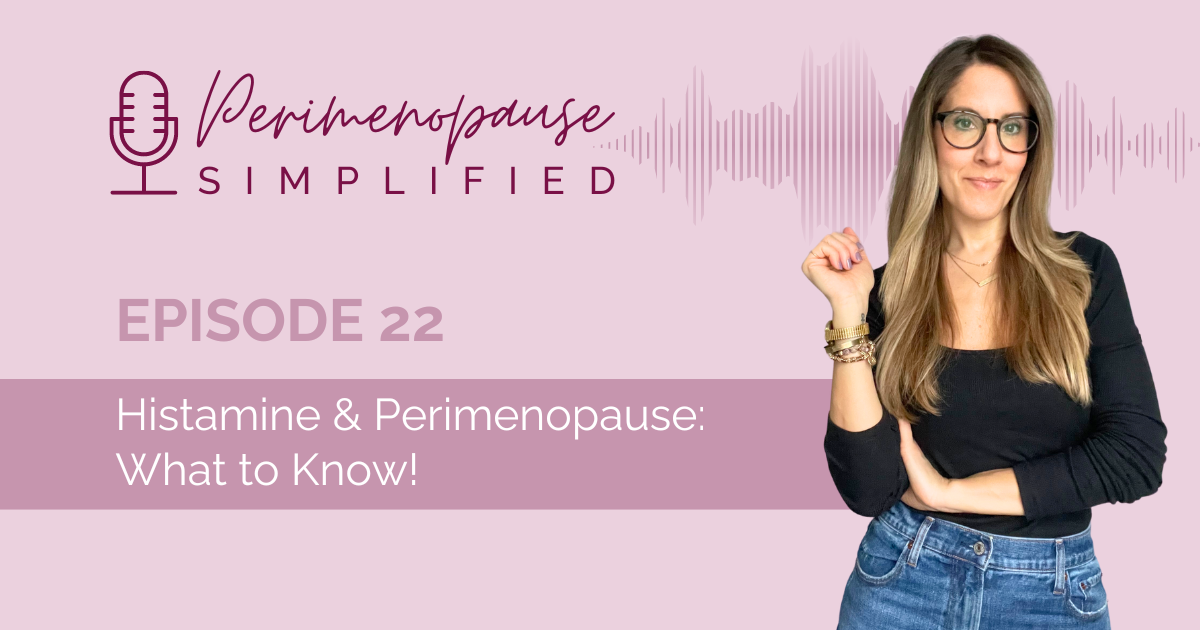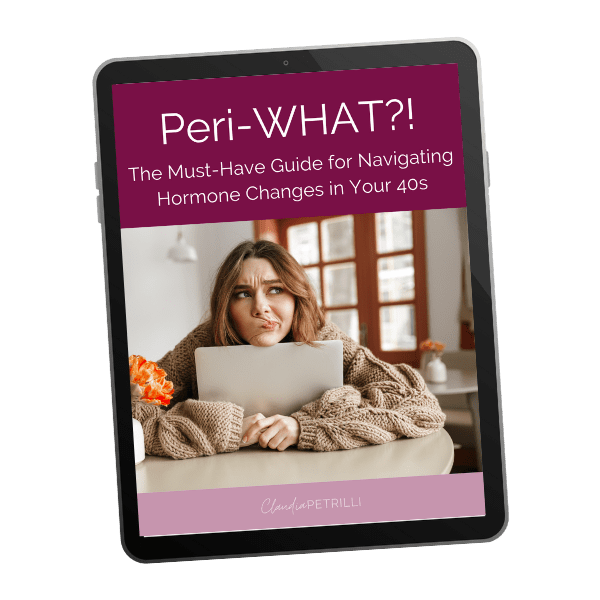What Does Histamine Have to Do with Perimenopause?
You may be thinking what does histamine have to do with perimenopause? Well, besides allergies, there are many more symptoms associated with histamine overload or intolerance, and not surprisingly, your hormones play a role. So let’s dive in.
The Role of Histamine in the Body
Histamine is an important chemical that is crucial to the health of your gut, brain, nervous system, and your immune system. It’s the immune-signaling protein produced by mast cells. Mast cells play a role in how the immune system responds to bacteria, parasites, mold, different allergens, fragrance, stress and essentially, they create an inflammatory response.
Histamine Clearance and Factors Affecting It
Histamine gets cleared out of the body with specific enzymes. We need it, but we don’t want too much. And if you have chronic inflammation, drink alcohol, have food sensitivities, or an imbalance of gut bacteria, that can affect how histamine gets cleared out of the body and can develop into histamine intolerance.
Foods and Histamine Release
Certain foods contain histamine and some cause us to release more of our own histamine from mast cells. Alcohol is a good example b/c it contains a lot of histamine so causes our bodies to release more histamine. So if you notice you feel terrible after drinking wine, this could be why.
Histamine in Leftovers
Another thing to consider is you may be completely fine eating freshly cooked food, but if you store it as a leftover and eat it a day or so later, you may have a reaction. Leftovers contain more histamine.
Gut Health and Histamine
In a healthy and diverse gut microbiome, dietary histamines can be broken down by an enzyme called diamine oxidase (DAO).
However, in a less diverse or imbalanced gut microbiome, DAO activity may be too low, so you may have a hard time clearing out the excess histamine.
Other Contributors to Histamine Intolerance
SIBO (small intestinal bacterial overgrowth), vitamin B6 deficiency, progesterone deficiency, or use of hormonal birth control can also contribute.
The Challenge of Histamine Intolerance in Conventional Medicine
Unfortunately, histamine intolerance is poorly understood in conventional medicine and rarely acknowledged. It’s more common in women than men and tends to be worse in midlife. I know, another exciting thing we have to deal with as women.
Symptoms of Histamine Intolerance
Symptoms of histamine intolerance can mimic allergic reactions like hives, skin rashes, itchy skin, flushing, IBS like symptoms, acid reflux or indigestion. You may even experience nasal congestion, dizziness, shortness of breath, heart palpitations, anxiety, brain fog, migraines, headaches, intense menstrual cramps, joint pain, and insomnia (histamine can be very stimulating and keep you up at night).
Hormonal Connections to Histamine
How your hormones are connected…
An excess of estrogen or my preferred term “unopposed estrogen” can cause you to overproduce histamine. Estrogen stimulates mast cells, so the higher the estrogen in the body, the higher the histamine. And too much histamine increases estrogen.
Histamine stimulates your ovaries to release more estrogen – a vicious cycle. Estrogen stops DAO enzyme from working well. If you are intolerant to histamine, you will not tolerate your own estrogen very well. In your 40s, estrogen starts to fluctuate wildly and at times, can be the highest it’s ever been, so you’ll have more histamine release. You might notice that symptoms get more noticeable during this time.
Progesterone and Its Anti-Histamine Effect
Progesterone, which we need to balance the effects of estrogen, is known as a mast cell stabilizer, so has an anti-histamine effect and decreases inflammation. But it starts to rapidly decline in your mid-30s. This is another reason why I love progesterone and believe SO many women would benefit from taking it.
Mast cell secretion may be regulated by progesterone and may explain the reduced symptoms of certain inflammatory conditions during pregnancy. The body develops a way of protecting the fetus from excessive histamine by increasing the amount of DAO and breaking down histamine more efficiently.
Other Hormones Impacting Histamine Levels
Some other hormones affect it too. When testosterone or cortisol levels are too high, that can trigger histamine release.
HRT and Histamine Intolerance
You know I’m a fan of HRT, but many women start HRT and feel worse. There are a number of reasons for this like dose, application, timing is wrong. But it could also be due to histamine intolerance, so it’s important to adjust your dosing accordingly, ensure you have ample progesterone, and approach histamine intolerance with a functional health approach.
Approaching Histamine Intolerance with Clients
Which brings me to…how we approach histamine with clients
One of the things we prioritize is gut health optimization via a GIMAP stool test, we focus on opening detox pathways, consider a low-histamine diet, get targeted supplement support & consider progesterone HRT.
Tracking Symptoms and Dietary Adjustments
To break it down further, we have clients track symptoms – first and foremost. Pay attention to when symptoms are the worst. For most women, it’s tied to the estrogen fluctuations in their menstrual cycle which occur after their period ends and then around day 21, a week or so before your period. Remember, as estrogen rises, so does histamine.
We suggest a short-term low histamine diet. Now this doesn’t mean you remove all histamine producing foods. We are not fans of super restrictive diets. We give clients a chart that shows some of the foods highest in histamine and if there are any they consume in abundance we suggest they remove them for a while and note symptom improvement.
Reducing High Histamine Foods
Especially helpful to reduce or eliminate these things the week or two before your period (or longer if you struggle with many of the symptoms I mentioned all month.
Some foods high in histamine are: fermented foods like vinegar, kombucha, yogurt, kefir, sauerkraut, and beer. Dairy, smoked fish, processed deli meats, some nuts/seeds, citrus fruits like lemon, chocolate and leftovers because of bacteria growth.
Other high histamine foods that may be problematic for you: avocado, canned foods, pickled foods, shellfish, strawberries, dried fruits, pineapples, papaya.
OTC Options and Supplements:
Some people take OTC antihistamines and may find relief; but ideally you wouldn’t take these long-term. You may notice symptom improvement with something like Pepcid which is an H2 blocker or histamine blocker and reduces stomach acid in the gut, made in response to histamine. But also not something you want to take long-term, as we need stomach acid. But for acute symptom management, consider it.
Supplements to Manage Histamine
Vitamin C at a low dose is a natural histamine.
DAO supplements – we like the Seeking Health brand by Dr. Ben Lynch. These are taken before meals to reduce response to histamine.
B6 and magnesium can be very helpful for this as well – both inhibit histamine release.
Quercetin and Bromelain are some others to consider.
All that said, I know it can feel a bit overwhelming. This is why we do what we do! The Hormone Rescue is currently closed for the month of June, but we are making updates behind the scenes and will be reopening in July. So make sure you get on my email list to be notified of the updates, pricing, payment plan and special bonuses you’ll love.
See you next week!







